France in the Eurovision Song Contest
| France | |
|---|---|

|
|
| Member station | RTF (1956-1964) ORTF (1965-1974) TF1 (1975-1981) Antenne 2 (1983-1992) France 2 (1993-1998) France 3 (1999-) |
| Appearances | |
| Appearances | 53 |
| First appearance | 1956 |
| Best result | 1st: 1958, 1960, 1962, 1969, 1977 |
| Worst result | 24th: 1998 |
| External links | |
| France 3 page | |
| France's page at Eurovision.tv | |
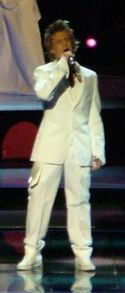
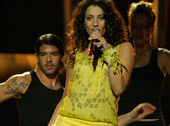
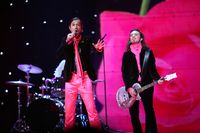
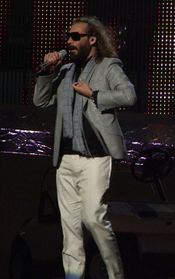
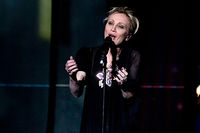
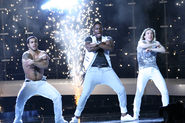
France is one of the most successful countries in the Eurovision Song Contest and has entered the competition fifty-three times since their debut at the very first contest in 1956. France is one of only seven countries to be present at the very first contest, and has only been absent from two contests in its history, missing the 1974 and 1982 contests. Despite appearing in the Contest for over 50 years, France has never taken last place, although they ended up placing second to last five times.
France has gone through a number of broadcasters that presented Eurovision to the French. From 1956 to 1964 Radiodiffusion-Télévision Française (RTF) was the French broadcaster. ORTF (Office de Radiodiffusion Télévision Française) took over from RTF in 1965, and showed Eurovision until 1973. TF1 took over from ORTF from 1975 to 1981, when they withdrew. Antenne 2 took over from TF1 in 1983 and its current incarnation, France Télévisions, is the current French broadcaster from 1992.
With the introduction of the semi-final in 2004 France 4 (part of France Télévisions) presents the Eurovision Song Contest semi-final, with France 3 continuing to organise a national selection for the participant song and present the Eurovision Song Contest final.
Contents |
Contest history
France is one of the most successful countries in the Eurovision, winning the contest five times, coming second four times and coming third seven times. More over, Amina was close to win with the song "Le Dernier qui a parlé..." in 1991, when she finished at the same points as Sweden. Both countries had an equal number of twelve points, but the profits went to Sweden, when France had fewer 10-points. Today, with the new rules, France would have won the competition, because they got points out of more countries than Sweden. One year before, France was also close to win, when Joëlle Ursull performed Serge Gainsbourg's song "White and Black Blues". The song came second.
However, in recent years, the French results have been somewhat disappointing. Since 1998, when the televoting was invented, France has almost always been in the bottom-10 countries in the final, coming 18th (2003 and 2008), 19th (1999), 22nd (2006 & 2007), 23rd (2000 and 2005) and 24th (1998). Despite this France has never come last in the contest since their debut.
Yet, France have had some good results during the 21st century. In 2001, Canadian singer Natasha St-Pier came 4th for France with her song "Je n'ai que mon âme", being the favourite to win the contest by fans and odds. This good result was carried into the 2002 contest, when Sandrine François came 5th with "Il faut du temps" and received the international press award for the best song and performance. Finally, the positive experience with Sébastien Tellier in 2008 created considerable interest among the French show business for the contest, which resulted in the fact that Eurovision is seen now in the French media as a great advertising campaign and it has been decided that big names will represent France in the future. With these ambitions, the French superstar Patricia Kaas represented France in the Eurovision Song Contest 2009 in Moscow, Russia. Kaas is one of the most successful French-speaking singers in the world and she has sold over 16 million records worldwide[1]. She ended in 8th place and as in 2002, she received the international press award for the best song and performance.
Absences
Since their debut in 1956 France has only missed two contests, in 1974 and 1982. In 1974, after selecting a singer and song to represent them at the contest, France withdrew after the President of France Georges Pompidou died in the week of the contest.[2] If they had participated in the contest, France would have been represented by Dani with the song "La vie à vingt-cinq ans".
In November 1981, TF1 declined to enter the Eurovision Song Contest for 1982, with the head of entertainment, Pierre Bouteiller, saying, "The absence of talent and the mediocrity of the songs were where annoyance set in. Eurovision is a monument to inanity [sometimes translated as "drivel"]."[3] Antenne 2 took over the job due to public reaction of TF1's withdraw, hosting a national final to select their entry as well, from the 1983 contest.
France and the "Big Four"
Since 1998, four particular countries have automatically qualified for the Eurovision final, regardless of their positions on the scoreboard in previous Contests.[4] They earned this special status by being the four biggest financial contributors to the EBU (without which the production of the Eurovision Song Contest would not be possible). These countries are the United Kingdom, Germany, France and Spain. Due to their untouchable status in the Contest, these countries became known as the "Big Four". Contest Executive Supervisor Svante Stockselius told reporters in a meeting with OGAE Serbia, that if Italy were to return to the contest in the future, that it would also qualify automatically for the finals, becoming part of a "Big Five". [5][6]
Contestants
| Year | Artist | Song | Place | Points |
|---|---|---|---|---|
| 1956 | Mathé Altéry | "Le temps perdu" | NA | NA |
| 1956 | Dany Dauberson | "Il est là" | NA | NA |
| 1957 | Paule Desjardins | "La belle amour" | 2 | 17 |
| 1958 | André Claveau | "Dors, mon amour" | 1 | 27 |
| 1959 | Jean Philippe | "Oui, oui, oui, oui" | 3 | 15 |
| 1960 | Jacqueline Boyer | "Tom Pillibi" | 1 | 32 |
| 1961 | Jean-Paul Mauric | "Printemps, avril carillonne" | 4 | 13 |
| 1962 | Isabelle Aubret | "Un premier amour" | 1 | 26 |
| 1963 | Alain Barrière | "Elle était si jolie" | 5 | 25 |
| 1964 | Rachel | "Le chant de Mallory" | 4 | 14 |
| 1965 | Guy Mardel | "N'avoue jamais" | 3 | 22 |
| 1966 | Dominique Walter | "Chez nous" | 16 | 1 |
| 1967 | Noëlle Cordier | "Il doit faire beau là-bas" | 3 | 20 |
| 1968 | Isabelle Aubret | "La source" | 3 | 20 |
| 1969 | Frida Boccara | "Un jour, un enfant" | 1 | 18 |
| 1970 | Guy Bonnet | "Marie-Blanche" | 4 | 8 |
| 1971 | Serge Lama | "Un jardin sur la terre" | 10 | 82 |
| 1972 | Betty Mars | "Comé-comédie" | 10 | 81 |
| 1973 | Martine Clemenceau | "Sans toi" | 15 | 65 |
| 1975 | Nicole Rieu | "Et bonjour à toi l'artiste" | 4 | 91 |
| 1976 | Catherine Ferry | "Un, deux, trois" | 2 | 147 |
| 1977 | Marie Myriam | "L'oiseau et l'enfant" | 1 | 136 |
| 1978 | Joël Prévost | "Il y aura toujours des violons" | 3 | 119 |
| 1979 | Anne-Marie David | "Je suis l'enfant soleil" | 3 | 106 |
| 1980 | Profil | "Hé, hé M'sieurs dames" | 11 | 45 |
| 1981 | Jean Gabilou | "Humanahum" | 3 | 125 |
| 1983 | Guy Bonnet | "Vivre" | 8 | 56 |
| 1984 | Annick Thoumazeau | "Autant d'amoureux que d'étoiles" | 8 | 61 |
| 1985 | Roger Bens | "Femme dans ses rêves aussi" | 10 | 56 |
| 1986 | Cocktail Chic | "Européennes" | 17 | 13 |
| 1987 | Christine Minier | "Les mots d'amour n'ont pas de dimanche" | 14 | 44 |
| 1988 | Gérard Lenorman | "Chanteur de charme" | 10 | 64 |
| 1989 | Nathalie Pâque | "J'ai volé la vie" | 8 | 60 |
| 1990 | Joëlle Ursull | "White and Black Blues" | 2 | 132 |
| 1991 | Amina | "C'est le dernier qui a parlé qui a raison" | 2 | 146 |
| 1992 | Kali | "Monté la riviè" | 8 | 73 |
| 1993 | Patrick Fiori | "Mama Corsica" | 4 | 121 |
| 1994 | Nina Morato | "Je suis un vrai garçon" | 7 | 74 |
| 1995 | Nathalie Santamaria | "Il me donne rendez-vous" | 4 | 94 |
| 1996 | Dan Ar Braz & l'Héritage des Celtes | "Diwanit Bugale" | 19 | 18 |
| 1997 | Fanny | "Sentiments songes" | 7 | 95 |
| 1998 | Marie Line | "Où aller" | 24 | 3 |
| 1999 | Nayah | "Je veux donner ma voix" | 19 | 14 |
| 2000 | Sofia Mestari | "On aura le ciel" | 23 | 5 |
| 2001 | Natasha St-Pier | "Je n'ai que mon âme" | 4 | 142 |
| 2002 | Sandrine François | "Il faut du temps" | 5 | 104 |
| 2003 | Louisa Baïleche | "Monts et merveilles" | 18 | 19 |
| 2004 | Jonatan Cerrada | "À chaque pas" | 15 | 40 |
| 2005 | Ortal | "Chacun pense à soi" | 23 | 11 |
| 2006 | Virginie Pouchain | "Il était temps" | 22 | 5 |
| 2007 | Les Fatals Picards | "L'amour à la française" | 22 | 19 |
| 2008 | Sébastien Tellier | "Divine" | 18 | 47 |
| 2009 | Patricia Kaas | "Et s'il fallait le faire" | 8 | 107 |
| 2010 | Jessy Matador | "Allez Ola Olé" | 12 | 82 |
Voting history (1975-2010)
France has given the most points to...
| Rank | Country | Points |
|---|---|---|
| 1 | 152 | |
| 2 | 146 | |
| 3 | 145 | |
| 4 | 136 | |
| 5 | 117 |
France has received the most points from...
| Rank | Country | Points |
|---|---|---|
| 1 | 139 | |
| 2 | 134 | |
| 3 | 126 | |
| 4 | 119 | |
| 5 | 115 | |
| = | 115 |
Televoting Trends
Since the introduction of the televote in 1998, France has frequently awarded relatively high marks to Turkey, Portugal, Israel, and now, Armenia and Serbia; countries with large diasporas in France:
- 1998 : Israel - 12 points; Portugal - 10 points
- 1999 : Portugal - 12 points (the only points for Portugal) ; Israel - 10 points
- 2000 : Turkey - 12 points ; Israel - 6 points (ending with 7 points)
- 2001 : Portugal - 12 points; Israel - 10 points
- 2002 : Israel - 10 points; Turkey - 7 points
- 2003 : Turkey - 10 points; Israel - 8 points
- 2004 : Turkey - 12 points; Serbia and Montenegro - 10 points
- 2005 : Turkey - 12 points; Israel - 10 points; Serbia and Montenegro - 6 points
- 2006 : Turkey - 12 points; Armenia - 10 points; Israel - 4 points (the only points for Israel)
- 2007 : Turkey - 12 points; Armenia - 10 points; Serbia - 8 points
- 2008 : Armenia - 12 points; Turkey - 10 points; Portugal - 8 points; Serbia - 7 points; Israel - 6 points
- 2009 : Turkey - 12 points; Israel - 10 points; Portugal - 7 points; Armenia - 6 points
- 2010 : Turkey - 12 points; Serbia - 10 points; Portugal - 8 points; Armenia - 6 points; Israel - 1 point
(since 2009, votes have been decided by a combination of 50% televoting results and 50% national jury.)
Hostings
| Year | Location | Venue | Presenter |
|---|---|---|---|
| 1959 | Palais des Festivals | Jacqueline Joubert | |
| 1961 | Palais des Festivals | Jacqueline Joubert | |
| 1978 | Palais des Congrès | Denise Fabre, Léon Zitrone |
References
- ↑ kabaretkaas.com
- ↑ History - Eurovision Song Contest 1974 Eurovision.tv
- ↑ 1982 Eurovision source in French
- ↑ O'Connor, John Kennedy (2005). The Eurovision Song Contest 50 Years The Official History. London: Carlton Books Limited. ISBN 1-84442-586-X.
- ↑ http://www.oikotimes.com/v2/index.php?file=articles&id=234
- ↑ Fulton, Rick (2007-05-14). "The East V West Song Contest". Daily Record. http://www.dailyrecord.co.uk/news/editors-choice/2007/05/14/the-east-v-west-song-contest-86908-19098830/. Retrieved 2009-05-24.
External links
- Huffington Post analysis
- French Eurovision site
- French website
- myspace Eurovision France
- Points to and from France eurovisioncovers.co.uk
|
||||||||
|
|||||||||||